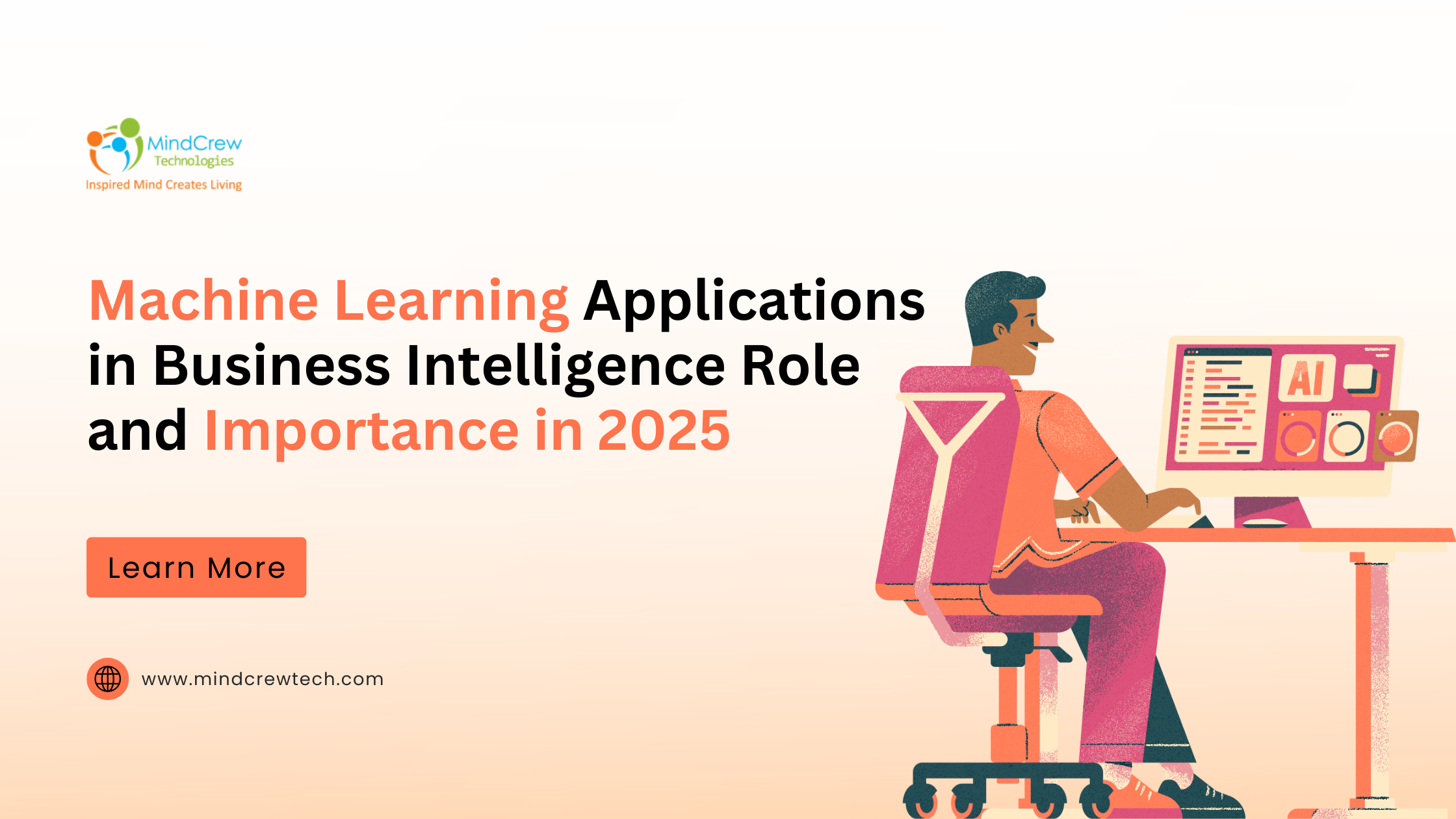Machine Learning Applications in Business Intelligence: Role and Importance in 2025
Machine learning (ML) is revolutionizing how businesses operate, and its integration with business intelligence (BI) has become a game-changer in 2025. By leveraging the power of machine learning applications businesses can uncover hidden patterns, predict trends, and make data-driven decisions with unprecedented accuracy. At mindcrewtech, we understand the transformative potential of this synergy and are here to guide you through the intricacies of how ML is shaping BI.
What Is Machine Learning in Business Intelligence?
What is machine learning? Machine learning is a subset of artificial intelligence (AI) that enables systems to learn and improve from data without explicit programming. When applied to business intelligence, machine learning applications enhance data analysis by automating complex processes, providing actionable insights, and enabling predictive and prescriptive analytics. At mindcrewtech, we integrate these advanced ML capabilities into BI solutions to drive innovation and efficiency for our clients.
Key Applications of Machine Learning in Business Intelligence
1. Predictive Analytics
Predictive analytics uses machine learning algorithms to analyze historical data and forecast future outcomes. Businesses can anticipate customer behavior, market trends, and potential risks. For instance, e-commerce platforms can predict customer preferences and recommend personalized products. At mindcrewtech, we design predictive models tailored to your industry needs.
2. Customer Segmentation
Understanding customer behavior is vital for targeted marketing. Machine learning algorithms analyze customer data to segment audiences based on preferences, buying habits, and demographics. This enables businesses to create personalized marketing strategies and improve customer retention rates.
3. Anomaly Detection
Machine learning applications excel at identifying anomalies in data, which is crucial for fraud detection, quality control, and operational efficiency. Financial institutions, for instance, use machine learning models to detect fraudulent transactions in real-time. mindcrewtech provides advanced anomaly detection systems to safeguard your business processes.
4. Natural Language Processing (NLP)
NLP enables machines to understand and process human language. In BI, NLP allows users to interact with data through voice commands or natural language queries. This simplifies data access and enhances user experience, making BI tools more accessible to non-technical users.
5. Demand Forecasting
Accurate demand forecasting helps businesses optimize inventory, reduce waste, and meet customer demands effectively. Machine learning models analyze historical sales data, seasonal trends, and external factors to provide precise demand predictions.
Benefits of Integrating Machine Learning into Business Intelligence
Improved Decision-Making
Machine learning applications in BI tools provide data-driven insights that enable businesses to make informed decisions quickly. With predictive and prescriptive analytics, companies can identify opportunities and mitigate risks effectively.
Enhanced Efficiency
Automation of data processing and analysis saves time and resources. Businesses can focus on strategic initiatives rather than manual data handling.
Competitive Advantage
Leveraging machine learning in BI gives businesses a competitive edge by enabling them to adapt to market changes swiftly and deliver superior customer experiences.
Industries Benefiting from ML-Driven BI
Retail
Retailers use machine learning applications for personalized marketing, inventory management, and sales forecasting. By analyzing customer data, they can predict trends and optimize pricing strategies.
Healthcare
Machine learning aids in patient diagnosis, treatment recommendations, and resource management. BI tools integrated with ML help healthcare providers deliver better patient care.
Finance
Financial institutions leverage machine learning for fraud detection, credit risk assessment, and algorithmic trading. BI tools with machine learning capabilities enhance transparency and decision-making in the finance sector.
Manufacturing
In manufacturing, machine learning-powered BI tools optimize production processes, predict equipment failures, and ensure quality control.
Future Trends in Machine Learning and Business Intelligence
Explainable AI (XAI)
As machine learning models become more complex, the need for explainability grows. XAI ensures that businesses understand how ML algorithms arrive at decisions, fostering trust and transparency.
Real-Time Analytics
Real-time data processing enables businesses to respond to changes instantly. Machine learning-driven BI tools are advancing to provide real-time insights for dynamic decision-making.
Integration with IoT
The Internet of Things (IoT) generates vast amounts of data. Machine learning algorithms analyze this data to provide actionable insights, enhancing BI capabilities in IoT-connected environments.
Augmented Analytics
Augmented analytics combines machine learning, AI, and NLP to automate data preparation, insight generation, and sharing. This democratizes data analysis, making BI accessible to all employees, regardless of technical expertise.
How mindcrewtech Can Help
At mindcrewtech, we specialize in developing customized machine learning applications and business intelligence solutions tailored to your unique business needs. Our team of experts leverages cutting-edge technologies to help you unlock the full potential of your data, drive innovation, and achieve your business goals.
Conclusion
Machine learning is redefining the landscape of business intelligence in 2025. By integrating ML into BI, businesses can gain deeper insights, improve efficiency, and maintain a competitive edge. Partner with mindcrewtech to harness the power of machine learning and transform your business intelligence strategy today.







